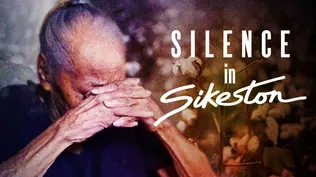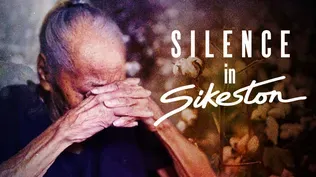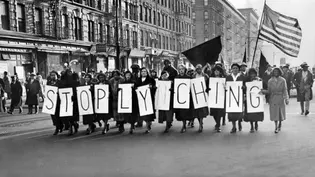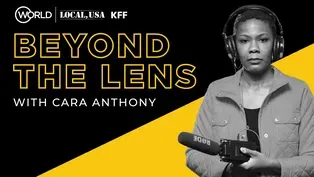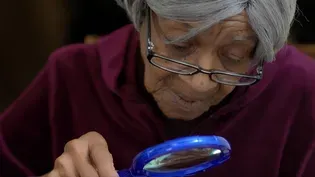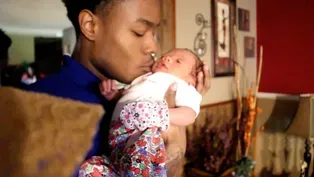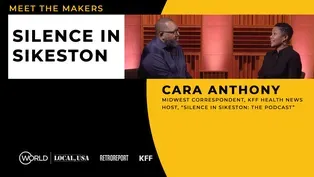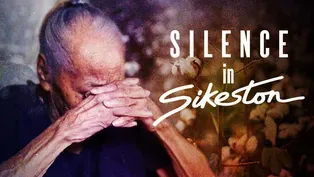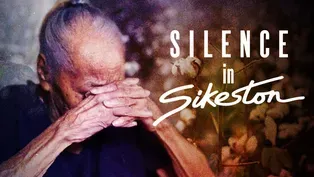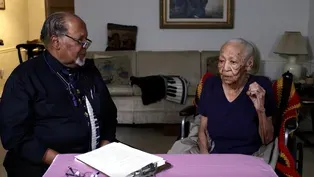
Silence in Sikeston
Season 8 Episode 12 | 55m 21sVideo has Closed Captions
How a lynching and police killing 78 years apart haunt the rural community of Sikeston, Missouri.
The story of how the 1942 lynching of Cleo Wright - and the subsequent failure of the first federal attempt to prosecute a lynching - continues to haunt the small city of Sikeston, Missouri. Then, in 2020, the community is faced with the police killing of a young Black father. The film SILENCE IN SIKESTON explores the necessary questions about history, trauma, silence and resilience over 78 years.
Funding for Silence in Sikeston provided by the Ford Foundation. Funding for Local, USA provided by the Corporation for Public Broadcasting, John D. and Catherine T. MacArthur Foundation and Wyncote Foundation.

Silence in Sikeston
Season 8 Episode 12 | 55m 21sVideo has Closed Captions
The story of how the 1942 lynching of Cleo Wright - and the subsequent failure of the first federal attempt to prosecute a lynching - continues to haunt the small city of Sikeston, Missouri. Then, in 2020, the community is faced with the police killing of a young Black father. The film SILENCE IN SIKESTON explores the necessary questions about history, trauma, silence and resilience over 78 years.
How to Watch Local, USA
Local, USA is available to stream on pbs.org and the free PBS App, available on iPhone, Apple TV, Android TV, Android smartphones, Amazon Fire TV, Amazon Fire Tablet, Roku, Samsung Smart TV, and Vizio.
Buy Now
Providing Support for PBS.org
Learn Moreabout PBS online sponsorshipTINA MCDUFFIE: In Sikeston, Missouri, 1942, a 26-year-old Black man was lynched by a white mob.
PERSHARD OWENS: The fact remains that this African American man was burned in front of a church, and we don't talk about it.
MICHAEL JENSEN: It was a brutal, morbid spectacle.
CAROL ANDERSON: People are running into the church going, "Oh, my God!
They are burning a Black man!
They are burning a Black man!"
HARRY SHARP: I did not hear about it from my parents or grandparents.
I asked them about it one time, after I'd heard about it.
But it was not subject to discussion.
MCDUFFIE: Almost 80 years later, another Black man died in a police shootout.
JEAN KELLY: Denzel deserved to live, he really did.
He deserved to have a chance to live.
MCDUFFIE: These stories still haunt the town today.
LARRY MCLELLON: For years, I've said, "You're gonna see one of our young men get shot down before long."
MCDUFFIE: From Retro Report and KFF Health News, "Silence in Sikeston," a special edition of Local, U.S.A. ♪ ♪ ♪ ♪ (people talking in background) RHONDA COUNCIL: This is a town of roughly 17,000 people, and if I had to take a rough guess how many Blacks here, 6,000, probably.
There's not a whole lot, but it's enough.
(marching band playing) All towns have good stuff along with the bad stuff, and unfortunately, something terrible happened here.
If you were to ask anybody in their 20s, maybe 30s, about the lynching of Cleo Wright, probably couldn't tell you.
And I'm talking about people here in Sikeston.
Not anywhere else-- here in Sikeston.
I don't know why it was a secret, but history can't be erased.
Even though that was over 70 years ago, the story needs to be told.
MCLELLON: Sikeston, they don't know how to start the healing process.
For years, I've said, "You're gonna see one of our young men get shot down before long."
And it, it wasn't long after that Denzel did get shot down.
This young man's life did not have to be taken.
This is the dark side of Sikeston.
♪ ♪ COUNCIL: Yes, ma'am.
I just remember hearing that this young man was lynched in Sikeston, and it was kind of hard to believe that that actually happened in this place that I grew up in.
But it was never talked about in public.
Just maybe with your family it was discussed.
But other than that, you never heard the story about Cleo Wright.
MABLE COOK: I was young then-- I just felt bad over it.
I felt hurt, mm-hmm.
COUNCIL: Nobody talked about it after it happened.
COOK: That's right.
- It was like it didn't even happen.
- Everybody said they wanted to get their mind off it.
They didn't want to think about nothing like that, but I think you should, you know, let somebody know something went on here.
COUNCIL: The railroad tracks are gone right now, but they ran right along this area here.
And this is where they came and they burned his body, right in front of the church right here.
CARLEEN HARRINGTON: We were just kids, outdoors playing and talking.
HARRY HOWARD: Mm-hmm.
HARRINGTON: Had a big police car come down the street, hollering, and saying, "All the (bleep) better get off the street."
- Are you serious?
- Because, uh, it had, had a, a man's leg tied to the back of a car.
Dragging him.
(car moving slowly) And so, they had drug him from downtown across the railroad track.
We was shocked, and you talking about, just, it was horrible feeling.
COUNCIL: Where were you at when it happened?
COOK: Standing on the porch.
We heard all the commotion, so, we, me and my sister, we got on, on the porch and looked out, and we saw them dragging him.
They could have just taken him and put him in jail or something and not do all that to him.
COUNCIL: So, it was a message they was getting out?
COOK: Yeah, that's right.
They did that so the next one should know not to be trying to do the same thing, see?
Mm-hmm.
(clanging softly) ♪ ♪ KELLY: Denzel died three months prior to his 24th birthday.
He was still young, vibrant, and energetic, and had so much love for his children and his family and friends.
And his smile was just amazing.
Who looks like him?
WOMAN 1: Oh, yeah, it is.
- Ayana?
- Yup.
(laughs) Just like him.
KELLY: Look at this picture.
(talking softly) This was taken a year before his death.
He was having trouble in school out here in Chicago, and after eighth grade, when he went into high school, there were a lot of shootings and a lot of gang activity, and so, I was, like, "No, I don't feel like you're safe here in Chicago."
So, we both agreed that he would go to Sikeston.
His dad and his stepmom, they both said, "Okay, well, he can stay with us out here."
MILTON TAYLOR: Well, when he was 15, he moved in with me.
I learned how to play, uh, how to play the 2K, how to play the basketball game, just to spend time with my son.
Once he hit 21, it was, like, back and forth.
He had his own family.
They were at my house all the time.
What is you doing, Bubba?
MIKELA JACKSON: We have three girls.
We have, our oldest name, her name is Deniya.
He named her after him, of course.
And then, we have our middle child.
Her name is Ayana.
Then we have Brooklyn.
I was actually four months pregnant with her when he passed away.
(girl exclaiming) JACKSON: Our oldest daughter, she asks me all the time, "Where Daddy at?"
And she say, "He sleeping."
And it broke me down, because no mother wants to hear their child say that about their dad.
It's heartbreaking.
(girls talking softly) ♪ ♪ MAN: It's time to pick a prize.
(bell ringing) ♪ ♪ JENSEN: The story of Sikeston is not unique.
It's not unlike a lot of other little small towns in the Midwest or across the country.
Founded in about 1860, kind of a Civil War kind of town.
This is the northernmost point in the United States where cotton is grown.
Does the South begin in Sikeston?
You could almost make that argument.
You really could.
I'm a lifelong resident of Sikeston, started a newspaper here, and was a publisher until 2019, when I retired.
SHARP: Living in Sikeston, there have been seven generations of my family.
And this woman right here is, from the picture is my mother.
My great-grandparents on my mother's side to my great-grandchildren, they all contributed in ways that involve the community and that made me who I am.
When I was a kid, Sikeston was known as the town with more millionaires per capita than any town in the United States.
We were not among them-- we were on the edge of them.
(marching band playing) Most of the uptown people had a patriarchal relationship with Black families.
If they needed food, the family would help.
If they needed medical help, the family would help.
So, you knew each other, you know?
(band music fades) MCCLELLON: One of the first things that I point out to people when they come here is the history of Sikeston, Missouri.
Sign says, "Sikeston, a white settlement, 1803."
It means hatery-- hatery, bigotry, you name it-- and this should actually be removed.
(train horn blows in distance) (horn blowing) (crossing signal fades) These tracks, it's supposed to be the dividing line between Black and white.
Back in the old day, when dark comes, you don't want to be caught over here after 6:00.
You want to be on this side of the tracks.
This area is called Sunset Addition.
This area is called white section of town.
♪ ♪ HARRINGTON: Sunset started where the railroad track was.
HOWARD: So, most of the Blacks lived there.
HARRINGTON: Mm-hmm.
(playing "Amazing Grace") HOWARD: Sunset, we had movie theater, stores.
HARRINGTON: Plenty of stores.
We had taxi cabs, dry cleaners, all kinds of things.
HOWARD: And the whole area, where you saw the Lincoln School, so kind of a self-sufficient community.
HARRINGTON: Yes.
(both chuckling) HARRINGTON: Kids on the streets playing.
It was, everything was just lovely as it could be for Black people.
(piano fading) HOWARD: The day the lynching happened, you all must've been totally surprised and shocked.
HARRINGTON: Oh, man, yes.
Cleo, he was a real handsome-looking guy.
Remember him just well.
I mean, he had a whole life ahead of him, big ball player.
HOWARD: He was well-known in the community.
- He was well-known in the community, yeah, that's right.
Because he was a very friendly person.
- Mm-hmm.
- We all really liked him a lot, and he had a beautiful wife.
Her name was Ardella Gay, and she was pregnant then, little kid.
It was so sad-- man, that was sad.
I've heard a couple of different versions of what happened, so I really don't know the truth.
One version that I've heard was, he broke into this white lady's house.
He apparently tried to attack her.
The second version was that maybe he had a relationship with the lady, and she didn't want nobody to find out about it.
I don't know.
JENSEN: The story of Cleo Wright is extremely complex.
You can speak to someone else, and their version of the story can differ.
And I certainly can't dispute them, and nor can they dispute me.
Cleo worked at the Sikeston Cotton Oil Mill.
The fastest way to get home would be to walk down the railroad track.
♪ ♪ But Cleo went three streets over, to Kathleen, and entered a home, the home of Sarge and Grace Sturgeon.
At some point, there either was a confrontation or an argument.
Cleo pulled a knife out, stabbed Grace in the stomach, and severely, severely injured her.
ANDERSON: The police and the neighbors come running.
They find Cleo Wright, and as they're putting him in the police car, he's fighting-- he's fighting really hard.
JENSEN: The police officer working at the time was a gentleman named Hess Perrigan.
Cleo pulled a knife and stuck it into Hess Perrigan's mouth.
Hess turned around and, with his .45 revolver, shot Cleo four times.
ANDERSON: They take him to the whites-only hospital.
Then, as it's getting light, they're, like, "You can't be here because you're Black."
And he's clearly dying.
JENSEN: This location right here was City Hall.
It was also the courthouse.
It was also the jail.
Police took Cleo down to a holding cell, which was right on the main level, basically by the front door.
ANDERSON: The townsfolk are milling about, because what has happened to Grace Sturgeon has riled up the white community.
And they began to break down the door to the jail.
♪ ♪ JENSEN: The crowd surged forward and pulled Cleo out of that cell and drug him off of the steps of the City Hall.
They hooked his ankles around the bumper of the car.
And they took him down to a location in Sunset, took some kerosene and poured it on the body, and lit the body on fire.
ANDERSON: As his body is on fire, church service is going on.
People are running into the church going, "Oh, my God, they are burning a Black man!
They are burning a Black man!"
JENSEN: The body remained out there all day on that Sunday.
The procession of cars going down Malone Avenue simply to see that was virtually bumper-to-bumper.
It was a brutal, morbid spectacle.
HARRINGTON: I said, "Daddy, we better get out of town.
They're setting Sunset on fire."
And police is, is everywhere.
I just wanted to leave, and, but Daddy kept saying, "We're not going no place, and we're going to be, live here."
So, our house that night was just full of people sitting up, drinking coffee, and just not, don't know what to do.
And they told me they picked up rocks and bricks and crowbars and just anything to protect our community.
- Mm-hmm, Daddy got shotguns and everything else.
It was a horrible time, and a lot of peoples left town.
And they left they properties and everything.
Had their suitcase on back of the cars.
I was crying and everything else.
It's difficult to wrap your mind around how people, civilized people, could put themselves in a situation where they would do something like that.
To my way of thinking, you had a Black man clearly attacking a white woman.
That was, in white society's mind, at least, the ultimate no-no.
ANDERSON: What you have coming out of the white community, after this kind of cathartic explosion of violence, is a retreat into the, uh, you know, "Well, we're civilized, "and we're not those kind of people, but we were driven to it."
JENSEN: Within every individual, within every community, there is good and there is evil.
And on a late January day in 1942, evil ruled the day.
They may have defined Sikeston, Missouri, for one day, but they don't define it for the history of this town.
♪ ♪ (people talking in background) MAN: We're going to play some music by some of the artists that will be performing next week.
KELLY: I always felt that Sikeston was a nice place to be, because I like kind of the country feel.
I always thought of Sikeston being a safe haven for Denzel.
I've heard a lot of times, mothers say, "Oh, why did they kill my son?"
I could never say someone deserved to die.
You know.
But Denzel deserved to live, he really did.
Um, he deserved to have a chance to live.
MILTON TAYLOR: I can't stop thinking what I could have done different to change the outcome of what happened that night.
I had been drinking.
Yeah, I'm sure I had been drinking.
He came and talked to me, asked me for some advice on some personal things, and my advice was not what he wanted to hear at the time.
I didn't find out until a month later that he was heartbroken.
He was, he was hurt.
See, if I had known that, I wouldn't have said the things I said to him to make him that angry.
JACKSON: When Denzel called me, and I said, "You know, it's 2:00 in the morning-- what you need?"
And he was, like, "I need you to come get me."
And in the background, I could hear his dad just full-blown, just, arguing.
I told him to leave my house.
You got, it's time for him to go.
"I'm not going to argue with you in my house."
As I was closing the door behind him, he pulled a gun out.
(body camera chirps) (emergency radio running in background) LISA TAYLOR: Ambulance coming?
OFFICER: Yeah.
(Milton Taylor whimpering) OFFICER: Who was it?
LISA TAYLOR: My stepson shot his daddy.
KELLY: After Milton was taken away in the ambulance and the police were still out on the property, Denzel ended up back at the house.
He was standing there-- he wasn't doing anything.
And then, when they turned the body cam on...
OFFICER: Show me your hands, now!
OFFICER 2: Take your hand out of your pocket!
DENZEL TAYLOR: Just kill me, bro.
OFFICER 1: Now!
(gun fires) OFFICER 2: Hands out of your... (radio beeps, guns firing) OFFICER 2: We got shots fired!
We need E.M.S.!
We got one subject down, shots fired!
OFFICER 1: Hands now!
Hands!
Hands!
(Denzel Taylor groaning) OFFICER 3: What's in his pocket?
Are you (bleep) serious?
OFFICER 2: Looks like a (bleep) stick of wood.
KELLY: Denzel was not armed.
He didn't pose a threat towards the police officers at all.
JACKSON: I couldn't believe it, because it's, like, how, how could you do a human being like that?
Especially someone that was unarmed.
(radio beeps, sirens blaring) (girl talking) JACKSON: I'm numb, but I'm more so angry, because I'm the one that has to deal with my kids asking about their dad.
(girl talking softly) ♪ ♪ NANNETTA FORREST: Well, my mother, she was pregnant with me at the time that it happened.
They tell me that people were so scared, they were packing their luggage and they were getting out of there.
And I don't know if we left right away or not.
But I do know one thing.
My mother never left her mother and dad.
Everywhere Grandma and Grandpa moved, that's where Mama moved to.
I was, like, 13, 14 before I even found out.
So, I really don't know a whole lot to tell.
They had, uh, an old show that used to come on called Strike It Rich.
ANNOUNCER: It's the original show with a heart, Strike It Rich.
FORREST: Celebrities would go on and try to win money for, like, underprivileged people.
HOST: Tom is a veteran.
His injury makes it impossible for him to do any hard, manual labor.
- Well, let's help him.
- Well, all right.
(audience applauding) FORREST: Grandpa told me, "You can go on there, Nan."
And I said, "Go on there with what?"
And that's when he pulled out this piece of paper.
♪ ♪ He told me that my father had been lynched, and that was my first time ever becoming aware of it.
I do wish I had got a chance to get to know him, because I often wonder what type of person would I be today had he been in my life.
Would I have been the same person?
Would I have been a different person?
And this is something I'll never know.
Every now and then, people still bring it up, about Cleo Wright getting lynched down South.
Had it been done differently, went to court, had a trial or whatever, but it didn't happen that way.
You did anything that didn't go along with what they wanted you to go along with, they could lynch you.
♪ ♪ They didn't think it was wrong, because they didn't, they didn't get punished for it, for one thing.
No, they didn't.
♪ ♪ KEVIN MCMAHON: Before the lynching of Cleo Wright, there were 3,842 lynchings in the United States, and the Department of Justice had not fully investigated any of them.
Lynchings clearly violated state law.
These were murders, the worst forms of murders.
FILM NARRATOR: In the park, a yelling mob of 10,000 white... BURNHAM: But the states weren't prosecuting, and lynching was never a federal crime.
♪ ♪ MCMAHON: There were movements to pass anti-lynching legislation, but it never became law.
So, this is the first time the Department of Justice steps in, saying, "We're going to prosecute you."
Where in the past, they would just look the other way.
(plane engines roaring in distance) (explosions erupting) FILM NARRATOR: December 7, 1941.
MCMAHON: The lynching of Cleo Wright happens a month and a half after Pearl Harbor.
Freedom means the supremacy of human rights everywhere.
To that high concept, there can be no end save victory.
(applauding) ANDERSON: This war is being cast as a human rights war against tyranny-- racial tyranny.
♪ ♪ Against a regime that is predicated on Aryan supremacy.
But there's a problem.
The problem is Jim Crow in the United States.
MCMAHON: You have this war against a racist Nazi regime, and the United States is representing itself as a defender of democracy.
And if it is a defender of democracy, how can you allow an individual who's been accused of a crime to be taken from a jail and lynched?
♪ ♪ ANDERSON: Japan looks up and is, like, "See?
Look at what they do to their own people."
♪ ♪ And so, the violence raining down on Black people in the United States becomes war propaganda for the Axis nations.
(radio chime plays) RADIO ANNOUNCER: A rumor originating in a certain quarters in the United States claims President Roosevelt is some kind of a Ku Klux Klan.
President Roosevelt also plays upon the loyalty of the colored people.
The repeated treacheries against their race for the past years give them very little reason to love him.
MCMAHON: This is a crisis of democracy being challenged by a serious foreign threat.
And you need to say, "Well, well, what is democracy?
"What's democracy for African Americans living in the South?"
♪ ♪ ANDERSON: You also had this agitation happening in the Black community of, "Remember Pearl Harbor and Sikeston, Missouri."
You have one of the premier Black newspapers in the nation launching what was called the Double V Campaign.
♪ ♪ The Double V Campaign was victory against fascists overseas and against fascists here in the United States.
♪ ♪ So, Black folks were making the connection that this war for freedom wasn't just a war for freedom over there.
It was for freedom here, as well.
WOMAN: ♪ If you people will listen to me ♪ ♪ From my heart I prayed anew ♪ ♪ For we are Americans ♪ SINGERS: ♪ Praise God ♪ WOMAN: ♪ We are Americans ♪ SINGERS: ♪ Praise God ♪ WOMAN: ♪ We are Americans ♪ ALL: ♪ Praise God ♪ ♪ Praise His holy name ♪ ♪ ♪ BURNHAM: After the Cleo Wright lynching, the political imperative to do something about this case was quite strong.
So, the Justice Department began to look at two statutes that had been used in the immediate wake of the Civil War to see if they could be applied to lynching situations.
Both of these statutes addressed activities to deprive an individual of his or her civil rights.
MCMAHON: When you've been accused of a crime, you have a right, a federal right, to a trial, and what the Justice Department wants to say is, "The members of the lynch mob have committed the crime "of denying Cleo Wright his right to trial.
"They've determined that he is guilty and then carried out the punishment, which is death."
♪ ♪ BURNHAM: The federal government conducted a fairly wide-ranging investigation.
And as investigators sought to find out who was in that mob, no one saw anyone.
(camera shutter clicks) No one could remember seeing anyone else in that mob.
♪ ♪ The Justice Department took their case against the lynchers to federal court.
The grand jury declined to indict.
They rejected the argument that the existing federal statutes applied in a lynching case.
So, not getting an indictment had a chilling effect on the federal government's initiative to use these statutes to address lynching.
It's very, very unfortunate that this case failed.
Had the Cleo Wright case been successful, those laws would have been muscular engines to address racial violence.
♪ ♪ (siren wailing, police radio beeping) (people talking in background) (camera shutter clicking) KELLY: I would imagine there would've been a different outcome if someone was out there trying to tell the cops, "Don't shoot him.
"Please, don't shoot him.
"Let him get a chance to explain his side of the story."
So, you know, how the law says innocent until proven guilty?
Who is the judge and who is the jury to make such, uh, decisions in such a quick manner?
REPORTER: Authorities say it could be several weeks before they can piece together exactly what happened on this street in Sikeston.
JAMES MCMILLEN: When there's something like that happens that's such a high profile, one of the first things that I do is contact the Missouri State Highway Patrol.
They conducted the investigation.
INVESTIGATOR: We're going to, uh, go over the events that took place Wednesday morning.
- I just looked up and saw somebody that matched that description that we were given.
I could tell that he was holding onto something, I just couldn't see what it was.
- We all have our, our weapons out, assuming he's armed, and he just seemed like he was just trying to... (sighs) Just getting the courage to (bleep) pull the gun out and (bleep) shoot us, you know?
In, in my mind, I mean, he thinks he just killed his damn dad, you know?
And what's shooting a police officer at that point?
OFFICER 1: Show me your hands, now!
OFFICER 2: Take your hand out of your pocket!
DENZEL TAYLOR: Just kill me, bro.
OFFICER 1: Now!
(gun fires) OFFICER 2: Hands out of your... (police radio beeps) (guns firing) OFFICER 2: We got shots fired-- we need E.M.S.!
We got one subject down, shots fired.
OFFICER (on radio): 10-4.
KELLY: I seen the body cam.
While they were saying, "Put your hands up!
Show me your hands!
", they didn't give him not even a minute.
OFFICER 2: Why didn't you just take your hand out of your pocket, man?
KELLY: The protocol is, you shoot because you're feeling in danger.
But if they're not waving a weapon at you, if they're not pointing a weapon at you, there is no reason, no excuse to draw a weapon and shoot someone.
MCMILLEN: It's when you feel like that there is a threat to your life or a threat to someone else's life, is when you can use deadly force.
Do I think that they intentionally shot him many times just out of meanness or, or... No, I don't believe that at all.
(siren wailing) (camera shutter clicks) There's got to be some accountability of not following these commands, and "accountability" may not be the right word.
But nobody wanted this to happen.
(siren blaring in distance) SHARP: This is Smith Chapel Methodist Church, and I came here in 1996 to be the pastor.
(voiceover): It was a Black congregation, and when I became pastor of the church, I had no idea that the guy had been dragged right by where the church was.
It would have been right down Osage Street here.
(voiceover): Cleo Wright was lynched in 1942.
That was the year I turned four.
I did not hear about it from my parents or grandparents, ever.
I asked them about it one time, after I had heard about it, but it was not subject to discussion.
JENSEN: By and large, Sikeston went on as normal.
They wanted to put it out of their mind.
They wanted to move on.
I think that the prevailing mindset at the time was, "It's over and it's done.
Let's move on."
COUNCIL: After you all saw the, the lynching that happened, did you and your friends talk about that?
COOK: We didn't talk about it, no.
Mm-mm.
My dad-- my daddy told us not to have nothing to be saying about it.
Said it'll go away if you not talk about it.
COUNCIL: It's got to kind of eat you up on the inside, witnessing something like that.
You just can't pretend that it didn't happen.
You can't.
I can't say I can just easily get over it, no, I wasn't there when it happened, but it has an effect on my grandmother.
She's a part of me.
I'm a part of her.
I used to ask Mom, you know, "What is this with this man that supposedly got lynched?"
And she told me, "Don't you ask no questions about Cleo Wright."
She knew what it was all about, and she didn't want to take no chance on that happening to me.
Young white ladies used to come out to my house and blow the horn for me.
My mom would tell them, "You all go on back uptown.
I don't want my son to get in no trouble."
See, I didn't cross the line, because I knew what was waiting any time you get caught up in something like that.
I knew what time it was here in Sikeston, Missouri.
(protesters clamoring) WOMAN: He didn't have no weapon, and they shot him anyway.
MCCLELLON: It's hard to get my people to protest.
JACKSON: I wasn't satisfied with how we protested.
The world, they have no idea who Denzel Taylor is.
They have no idea he got shot 19 times by police officers, from chest on down to his legs.
WOMAN: Hands up!
WOMAN: Don't shoot!
JACKSON: When we did the protest for Denzel, we wanted them to feel our pain.
MAN: They're trying to kill all of us.
JACKSON: But the protest didn't do much.
MCCLELLON: It's a funny thing.
It just washed away in the rinse.
You didn't hear anything else.
You know, some of our own people, they have a problem when they see you speaking out regarding an issue like that.
MAN: Police violence no more!
MCCLELLON: And when all this stuff was going on about George Floyd, worldwide, Sikeston stood pat.
Nothing.
Sikeston, they're stuck in times, and they're just afraid of things that has happened right here in this town.
They don't want trouble to arrive.
(car door shuts) I tell them, "Hey.
"You can speak out and support whatever we're trying to do."
But it doesn't hardly reach first base.
They say right now that we've come a long ways.
But we haven't really came a long ways, because they are still shooting us down every day.
And I, and... (exhales) (sniffs) So, it gets, it gets next to me.
(sirens blaring) ANDERSON: When I think about the line that goes from the way policing worked in the past to what we're seeing today, it is that you've got a system that says, "You're guilty before you're innocent."
Lynching created a narrative that Black people were so criminal that they did not deserve to go through the justice system.
They deserved whatever punishment that the community could mete out to them.
The inability to talk about these events generated enormous trauma for those who witnessed them, and that trauma was carried across the generations.
COUNCIL: I can't even imagine what my grandmother saw or what the whole Sunset community saw at that time.
Nobody deserves to be lynched, I don't care what you did.
If they arrested him, that was fine.
But then to drag him through the streets?
That was so wrong.
It's easy to sort of be outraged if somebody who was innocent of a crime gets lynched.
If you want to defend the right to a trial by jury, it's got to be for everyone, not just those who you think are innocent.
ANDERSON: The people who yanked Cleo Wright out, nothing happened to them, and we see that moving forward.
The lack of accountability in policing for killing Black people, that ability to hold life and death in your hands with impunity.
BURNHAM: Although there have been many changes in the law, what lingers in our legal system from 1942 is really our inability to control police violence against people of color.
♪ ♪ ♪ ♪ JACKSON: The officers was put on leave, and they returned back to work after that.
They was not on leave long at all.
♪ ♪ I feel like had they tased Denzel, or just did matters completely different, Denzel would have had his day in court.
Denzel would have been able to tell his side of the story.
♪ ♪ KELLY: I obtained a lawyer, and I just say it's a moral standard for me to seek justice.
I hope that the police officers, the, the chief of police, I hope they have a wake-up call, and I want them to be cognizant of what they are to do when they put on their uniforms and they get their weapons and they're out to protect people, and not to kill people.
MILTON TAYLOR: I was angry.
I was very angry at Denzel.
I was angry until I saw that video.
When I saw that video, my anger just went away, and I, I began to cry, and...
They took away my chance to make amends with my son.
They were supposed to come there and defuse the situation, and they made it worse.
Denzel needs justice.
Just like any other person that has been put in Denzel's situation.
♪ ♪ This, according to Cleo Wright's death certificate, is where he was buried.
And I do wish he had some kind of acknowledgment out here.
We can't help what our ancestors did in the past.
We can't help that, but I would like for just one white person to acknowledge and say this happened, and for them to say they're sorry, as well.
MCCLELLON: It's a major problem because they know what they've done.
They don't know how to start the healing process.
SHARP: I would like some magic fairy dust to heal this community.
I don't know what it is, but there are always people that would say, "See how bad the white people were?
", and make that meaning "are."
I have no question there were some bad people involved with that lynching, but let's don't paint everybody with that brush.
♪ ♪ JENSEN: I think there remains a level of communal shame, communal regret, and I can't justify it.
But let's let a sleeping dog lie.
I mean, come on.
What is served by talking about this?
Okay?
Will it change our community?
Will it, will it improve race relations in our community?
It's legitimate to say, "Are you really trying to grind down to zero or are you just picking a scab?"
(kids calling) (music playing on speakers) OWENS: Hello, everybody.
My name is Pershard Owens.
Juneteenth is something important that we have not been taught while we were growing up.
It's time for us to stop expecting other people to educate our kids on our history, and it's time for us to start stepping up and doing it on our own.
(crowd applauds and cheers) (people exclaiming) OWENS: There is something deeply embedded in Sikeston that needs to be uprooted.
And that way, we can move forward.
The fact remains that this African American man was burned in front of a church, and we don't talk about it.
When I saw the video of Denzel Taylor, when that got released, that hurt me, because that could have been me.
OFFICER: We got one subject down, shots fired.
OWENS: That could have been my nephew.
That could have been my brother.
And, um, you know, it's just hard.
(people talking in background) OWENS: I want people to understand that not all Black men are a threat.
I'm a person, just like the next person is, and, you know, when you see stuff like that happen, it's just, like, "Okay.
What do we do to change it?"
(talking in background) You know, the video is out on, on social media.
(voiceover): I had never really considered myself to have any prejudice or bias.
How you all doing?
(voiceover): But I came to Sikeston to work as a police officer, and some of my first calls in the Black community were dealing with drug dealers and people in shooting cases and stuff like that, I started thinking, "I don't have anything in common with these people," and just unfairly judged the whole community off those few experiences.
So, case by case, you know, it didn't happen overnight, but I started to learn how, really, I had that wrong.
♪ ♪ Where do you preach at?
(voiceover): I think that our failure at times is that we don't really consider ourselves as an entire community.
We've got to be willing to look at and just say, "How can we better this?"
♪ ♪ ♪ ♪ ♪ ♪ OWENS: I came here looking for truth.
I wanted to know more about the lynchings that I never was taught in school.
I want to know all of the history.
I don't want a watered-down version of it.
In the museum, one of the things that was written on the wall was, "Slavery, it didn't end.
It just progressed."
Bringing more awareness to Cleo Wright is going to upset a lot of people.
In Sikeston, there is so much tradition.
At some point, you just have to say, "You know what?
"If it pisses you off, it is what it is.
It's the truth and we need to talk about it."
(piano playing gospel song) (people applauding and exclaiming) (piano continues) CHOIR: ♪ Glory, glory ♪ ♪ Hallelujah ♪ ♪ As I lay my ♪ ♪ Burden down ♪ (song ends, people applauding) We are honored and humbled to serve as instruments in the remembrance service for Cleo Wright.
(playing softly) OWENS: And while we are here, gathered for, for such a, a horrible crime that was done, we have to remember that things cannot change unless it's us who do it.
(audience exclaims, applauding) OWENS: And the song I'm going to sing is called "A Change is Gonna Come," and that change is gonna come.
(exclaiming, applauding) (piano playing slowly) ♪ I was born by the river ♪ (audience applauding) ♪ In a little tent ♪ ♪ And just like the river, I've been running ♪ ♪ Ever since ♪ ♪ It's been a long ♪ ♪ Long time coming ♪ ♪ But I know ♪ ♪ A change is gonna come ♪ (song fading): ♪ Oh, yes, it is ♪ COUNCIL: The African American community has always been silenced for fear of something possibly happening to their family or to themselves, but right now, we are giving Cleo Wright a voice.
I never in a million years thought this would happen.
My grandmother Mable and my Aunt Carleen unfortunately passed away not even a year apart.
And I hate that she could not have seen this... (breath catching) I hate that she could not have seen this happen, because she had kept that story to herself for so long.
To be able to say it, to be able to tell it, this is just so amazing, so amazing-- she'd be so happy.
MICHAEL HARRIS: Sikeston has some history we still have yet to work towards resolving.
The lynching of Cleo Wright, uh, it, it shaped the mindset of how we as citizens of Sikeston respond to one another.
I was trying to pull out all the topsoil that I could so that we can have some clean fill when we get ready to put it into the jars.
I think this will kind of capture the essence of the occasion.
♪ ♪ (people talking in background) MICHAEL SNIDER: Once I got to Sikeston, I was welcomed with open arms, because I was Cleo's great-grandson, and I didn't realize what kind of impact it had on the town until I got here.
It scarred Sikeston.
Even the newer generation can see that something was wrong-- something's wrong here.
KYLE PERNELL: How do you offer a prayer when there are so many different emotions and things that are going on?
The Bible says that the Lord spoke to Cain and said, "The blood of your brother "is crying out from the ground unto me."
And the blood is still crying out.
It's been crying out, but nobody has been echoing what it's been saying until now.
♪ ♪ SNIDER: It's a victory over that mental slavery.
Once we were able to break them, them mental chains, people started voicing.
They started asking questions.
HARRIS: Y'all keep coming-- any, any jar.
SNIDER: It's the beginning of acknowledgment, and that being quiet isn't the answer.
It's still tragic, but we can actually talk about and express how we feel about it in the open.
So, instead of an apology, I'd rather see change.
I'd rather see a more positive turn in life for the community that has such a tragic history.
♪ ♪ ♪ ♪ ♪ ♪ ♪ ♪
Silence in Sikeston | Before Lynching Became a Crime
Video has Closed Captions
Before the death of Cleo Wright in 1942, lynching was never prosecuted as a federal crime. (56s)
Silence in Sikeston | Beyond the Lens with Cara Anthony
Video has Closed Captions
Journalist Cara Anthony reveals a piece of family history that parallels SILENCE IN SIKESTON. (8m 12s)
Silence in Sikeston | In the Aftermath of Trauma
Video has Closed Captions
Sikeston residents share how they had to live following the lynching of Cleo Wright. (56s)
Silence in Sikeston | Love & Grief for a Young, Black Father
Video has Closed Captions
A mother talks about her son's life in Chicago and Sikeston, MO before his death by police. (59s)
Silence in Sikeston | Meet the Makers
Video has Closed Captions
A conversation about the film and podcast and what they examine and expose about silence and health. (16m 10s)
Video has Closed Captions
How a lynching and police killing 78 years apart haunt the rural community of Sikeston, Missouri. (30s)
Video has Closed Captions
How a lynching and police killing 78 years apart haunt the rural community of Sikeston, Missouri. (1m 17s)
Silence in Sikeston | Witnesses to a Lynching
Video has Closed Captions
Two residents recall the day they, as young children, witnessed the lynching of Cleo Wright in 1942. (59s)
Providing Support for PBS.org
Learn Moreabout PBS online sponsorshipFunding for Silence in Sikeston provided by the Ford Foundation. Funding for Local, USA provided by the Corporation for Public Broadcasting, John D. and Catherine T. MacArthur Foundation and Wyncote Foundation.
